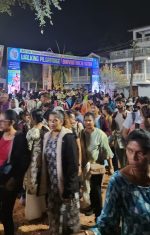By Saramma Emmanuel
Indore: Rama Bai feels excited as one of her long cherished dreams has came true after three decades.
“Now I have an identity and nobody can ill-treat me or forbid me from collecting waste,” a jubilant Bai told Matters India on December 19.
The 55-year old mother of eight was among 250 rag pickers who on December 12 received identity cards from Indore Municipal Corporation Mayor Malini Gaur.
Bai said she has collected waste for more than 30 years in Indore, the commercial capital of Madhya Pradesh, a central Indian state.
The civic body will issue similar identity cards to others involved in the same work as part of its effort to ensure their safety and livelihood and also to keep the environment clean.
Bai said that she and other rag pickers, under the leadership of a Catholic organization, have struggled for 15 years to secure social recognition.
“We faced enormous difficulties when we go out to collect the garbage, as we did not have any identity,” she explained.
Getting the identity card is “a dream come true for all of us, who had no identity of our own in society,” said Bai struggling to overcome her happiness.
The illiterate woman credits the Jan Vikas Society (JVS, society for welfare of people), an NGO managed by the Society of Divine Word congregation, with the achievement. She said the JVS gave them continued support and guidance in their demand for social recognition.
“Society often treats us like outcasts and no one really came forward to help us as we struggled except the Church,” she says.

“Our studies have found rag pickers, especially women, faced immense problems as no one was there to help them. The plight of domestic workers was too pathetic. So, we decided to work for them,” Father Payattikattu told mattersindia.com.
Currently, the society works among more than 10,000 downtrodden people living in 35 of the 559 slums recognized by the state government in Indore. More than 3,000 of them are women.
The NGO also serves among domestic workers and other weaker sections in the shanties of this business town.
“We are grateful to the urban civic body for accepting our demand and issuing identity cards to rag pickers,” says JVS incumbent director of Father Roy Thomas.
“Now the rag pickers can assert themselves and collect waste without fear of harassment and humiliation”, the Divine Word priest told mattersindia.com. “This will not only empower them but also make them eligible to collect garbage from public places and homes without any hurdle,” he added.
According to him, anyone could abuse these people with impunity until now. “Now all these are going to be a thing of past,” the priest predicts.
Geeta Bai, another card-holding rag picker, says they were used to abuses and inhuman treatment from many people who considered them as untouchables.
“Since there was no recognition to us, we could not even approach the police for action as it would then distorted to be a case of attempt to steel or something else. So we silently suffered such humiliations and harassments,” she added.
Father Payattikattu says most of those involved in waste collection are people with no basic identities as they have migrated from villages to cities to eke out a living. “They are also illiterate and are unable to understand legal formalities, therefore, no one listens to them and their issues,” adds the priest, who now works in another mission station.
According to him, in many cases, the rag pickers are unable to explain the atrocities they suffer. “This forced us to work for them,” he adds.
The society also supports their families as well.
Augustinian Sister Julia Thundathil, a social worker who had worked among these people in the initial stages of the NGO, says no improvement could be brought to them unless “we help them lead a good family life.”
The nun had joined the rag pickers to gather garbage in the morning for a year to win their confidence. Initially, the rag pickers had suspected the Church started the NGO to convert them to Christianity.
Madhya Pradesh is among the few states in India that have strict ant-conversion laws making religious conversion a punishable offence.
“We therefore, formed a cooperative society and started small savings to save them from the clutches of money lenders who used to charge exorbitant interest on loans,” the nun recalls.
The Church workers also started Self Help Groups for helping them to come up in life though different programs.
The society, Father Thomas explains, “also provides vocational training for skill development such as tailoring, beautician’s course etc to them and their kids.
“We do their regular health check up and educate 350 of their drop-out children through Bridge School Centers in different slums, career guidance and counselling are provided to the members of Youth Club too,” the priest explains.
The rag pickers too acknowledge the contribution of the Church for their empowerment and recognition.
“We could not have achieved any of these things without the Church support, says Suman Bai, another rag picker.
“The society always looks at us with a sort of contempt and never allowed us to go close to it, despite we kept the city and its surroundings clean. It is the Church people who consider us as respectable human beings and came to our help,” she says.
Father Payattikattu said they organized a protest in New Delhi in 2010 for the basic rights of the rag pickers, who face similar problems all over India.
The Indore initiative, he says, will become a model for the entire country.
Some rag pickers say the identity cards alone will not solve all their problems. Rama and Geeta say they need to connect to the mainstream society.
“The government must do to help us gain real social recognition,” they added.









